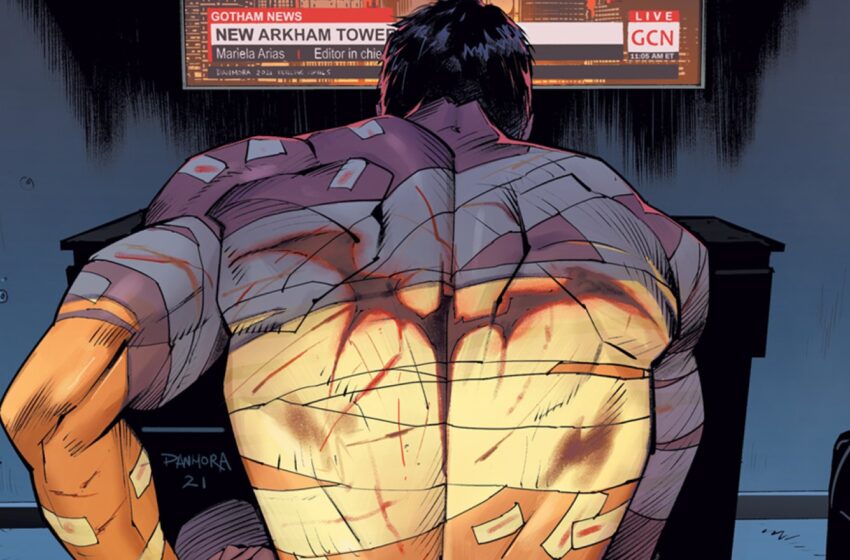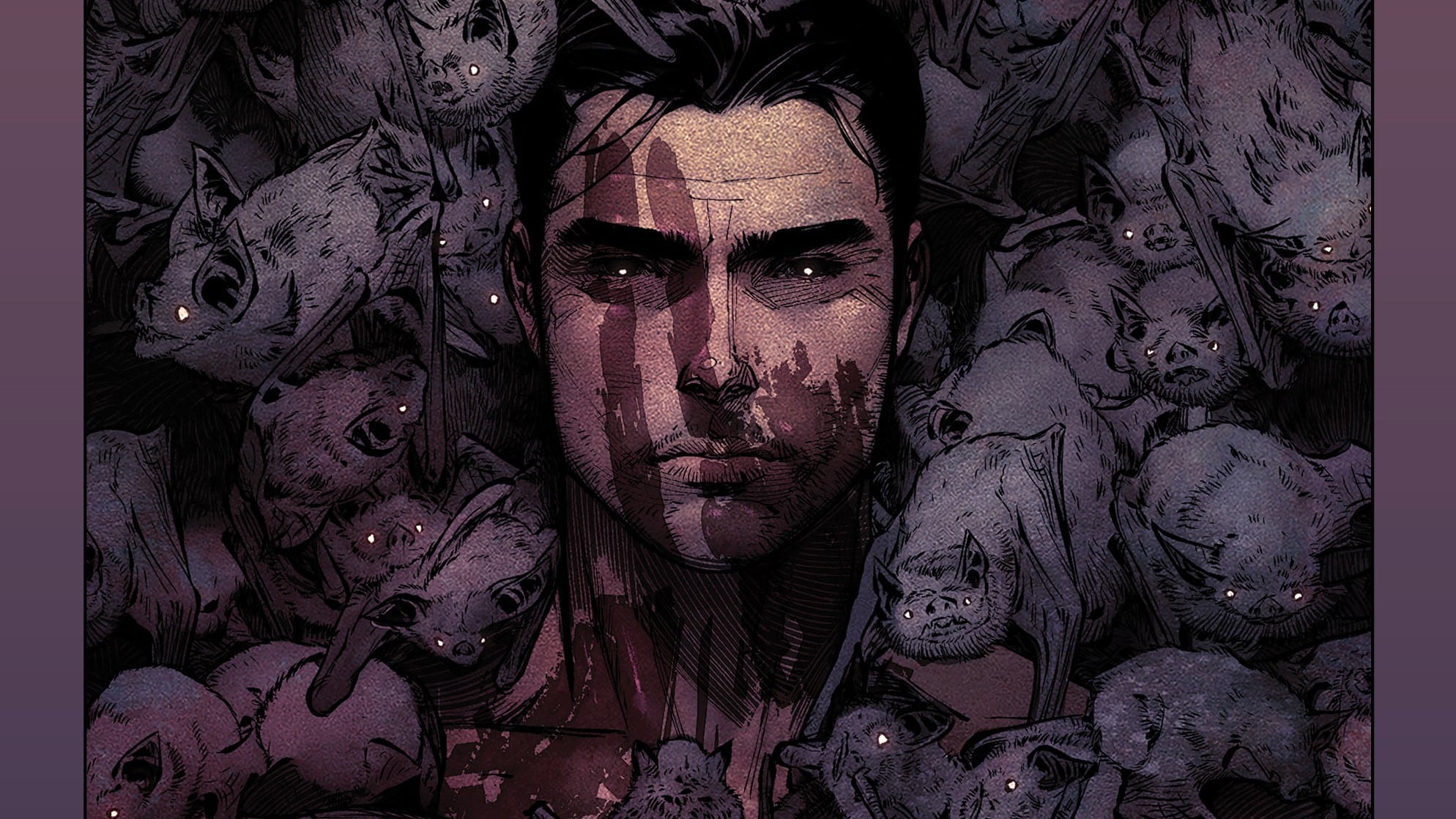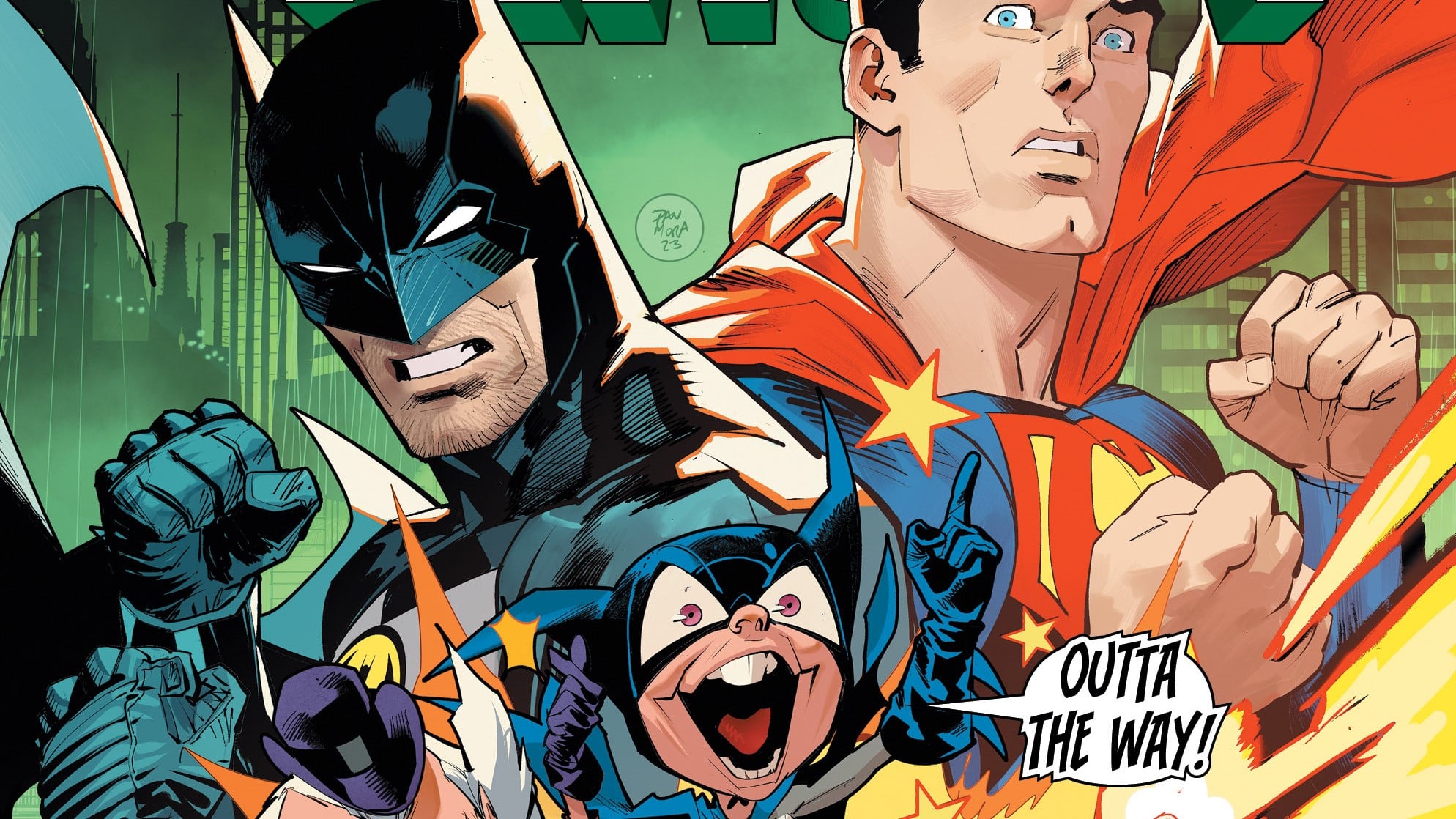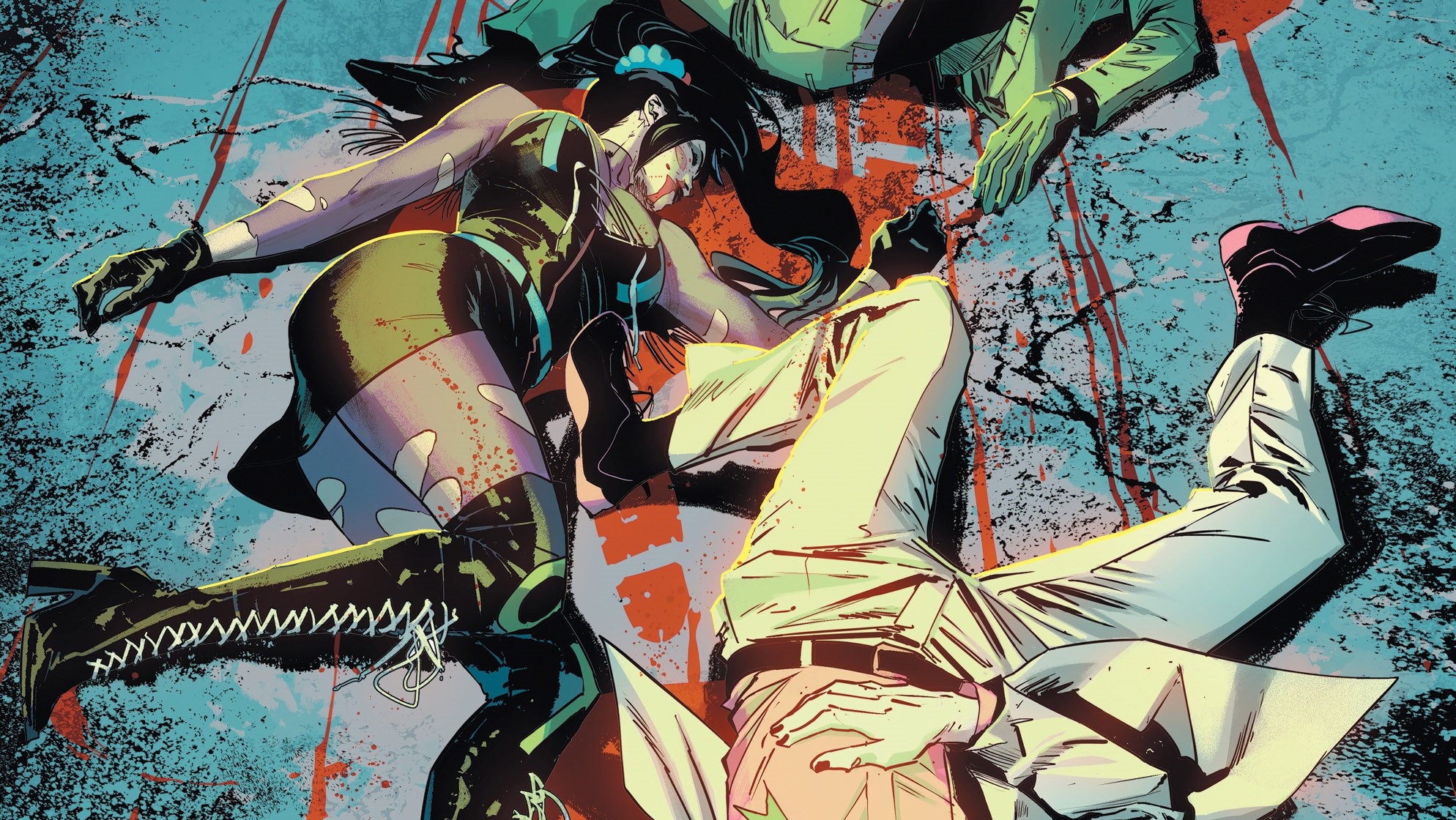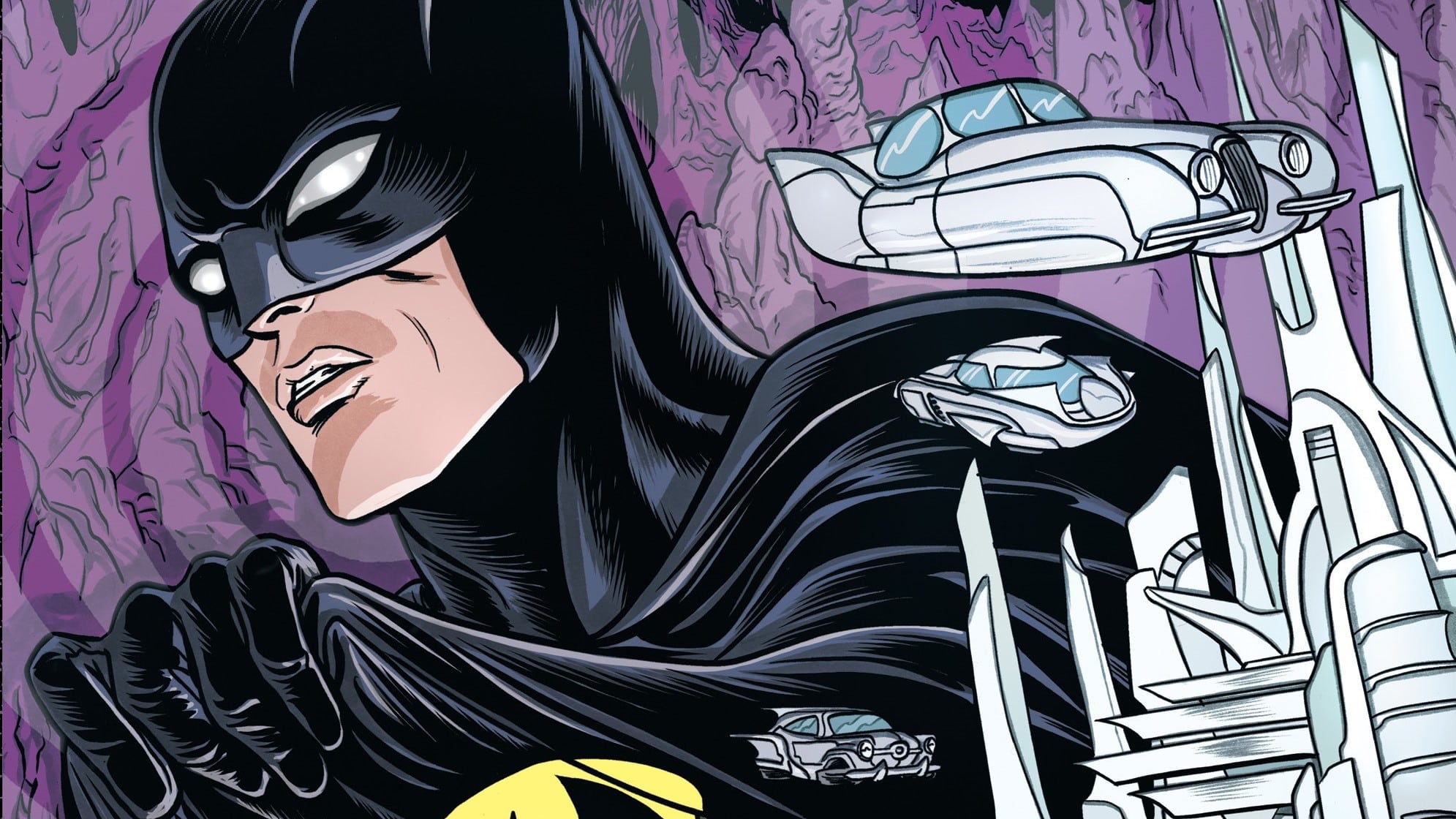Welcome back to BatChat! In Detective Comics #1,046, we are treated to the setup of many plots that will come to fruition in the upcoming “Shadows of the Bat” arc in a story written by Mariko Tamaki, drawn by Dan Mora, colored by Jordie Bellaire and lettered by Aditya Bidikar. In the backup, Batman is on a magical mystery tour as Arkham Tower may fall before it is even complete in a story written by Stephanie Phillips, drawn by David Lapham, colored by Trish Mulvihill and lettered by Rob Leigh.
Red Hood is dead! Well, briefly anyway. Some questions are answered and some new ones are presented in Task Force Z #3, written by Matthew Rosenberg, pencilled by Eddy Barrows, inked by Eber Ferreira, colored by Adriano Lucas and lettered by Leigh.
And speaking of questions and answers, everything is finally revealed in The Joker Presents: A Puzzlebox #13 & 14, written by Rosenberg, drawn by Mike Norton and Victor Sifuentes (issue #13) and Jesus Merino and Sifuentes (issue #14), colored by Roman Stevens and Ulises Arreola (issue #13) and Arreola (issue #14), and lettered by Ferran Delgado.
Matt Lazorwitz: So it’s New Year’s Eve, Brother Will. A time to look back on what’s come before, and to think about what we’ll be doing in the future. It’s fitting, then, that this week’s books are a setup for one of the big events of next year, a story about second chances and resurrection, and the wrapup of a fairly long-running series.
Will Nevin: Indeed, it is a time to reflect, Brother Matt, and it’s a good week for that. Also, there’s nothing that got you frothing mad this week. Ain’t that somethin’?
The Past Is Prologue

Matt: With Batman preparing to leave Gotham, this issue feels like a passing of the torch, figuratively anyway. We get some Batman, and we get some of the characters who will be filling the hole he’s leaving in Gotham for the foreseeable future, and that way the change next month when there’s no Batman in Detective Comics will feel less jarring.
Will: ‘Tec without Batman and Batman without Gotham. Good luck, DC!
Matt: I’m willing to give a ‘Tec run without Batman a shot, as it’s something that has worked well before when there was intent to it; I’m thinking about Rucka and Williams’ Batwoman run. I’ve always liked a series that looked at the characters surrounding Batman. But there’s a word there: intent. I feel like this could work because there seems to be a story here that is being told and works because Batman isn’t around. It’s a logical progression of what we’ve been seeing. Now, I could be very wrong, but I hope I’m not.
Will: ‘Tec always needs a raison d’etre, lest it become Batman 2, so I’m not saying it can’t work; it certainly did with Tynion’s run. I think my problem here is that I’m not immediately invested in this story. After reading this issue — which had some amazing art, by the way — I had (more trouble than usual) even remembering what I had just read. I get that this is here to set up what’s to come, but goshamighty, this thing was wafer-thin on substance.
Matt: Yes, after a 10-page action scene, no scene lasts more than three pages, and most are only one or two. That’d be fine if it was a montage, but it’s supposed to carry emotional weight that it doesn’t take as much time as needed to address.
Also, I’m going to take us down our first tangent of the column. The scene with Mayor Nakano’s wife bothered me. Nakano finds his wife, who we last saw as quite pregnant, lying in her bed in the dark staring off into space. Did you read that, like I did, as postpartum depression?
Will: The scene of Nakano toting a baby makes a bit more sense now that you mention that. That’s a tricky thing to address in a comic, but I’m certainly going to give Tamaki the benefit of the doubt. (Not that you’re saying she couldn’t pull it off.)
Matt: I’m not, but I am worried about it because of the thorniness of the issue itself, and because Nakano says that one of the new doctors who are running Arkham, Wear and Ocean, have said that their cure for the mentally unwell at Arkham can cure anyone “trapped in darkness.” That idea of a one-size-fits-all cure to mental illness? That is VERY sticky territory, and something I feel needs to be tread with delicately if you’re dealing with people suffering from conditions people have in real life, as opposed to the wide-open mental illness of your standard Arkham villain. But Tamaki deals with delicate issues in her work outside of superheroes, so I’m more than willing to see where this goes and not condemn her; I just have concerns.
Will: I think the thing that bothers me here is that we know Nakano isn’t going to make good decisions here, right? He exists to be a bureaucratic antagonist, and he’s going to watch this “treatment” — whatever it is — and be an advocate for it in some way. That doesn’t seem like the best setup for a serious examination of this problem.
The Quick Are the Dead

Matt: Task Force Z is turning into something I wasn’t exactly expecting, and that isn’t a complaint. The advance press for this thing made it seem like it was going to be just a big monster brawl book, which isn’t a bad thing. But Matthew Rosenberg is going in a different direction now. It’s becoming about mortality and about how we perceive our actions. And if any character can look at those themes, it’s Jason Todd, everybody’s favorite sad boy former Robin.
Will: What really struck me in this week’s issue is that for the first time outside of Batman, it seems like Alfred’s death has some real meaning. Red “Sad Boy” Hood should absolutely have some misgivings working with Bane, and I’m glad to see he’s both working to resolve those feelings while also getting some measure of revenge.
Matt: OK, everyone knows your feelings about Damian Wayne, but when the current Robin ongoing starts appearing on DC Universe Infinite, where you don’t have to pay for it, you should check it out. First because it’s going to be crossing over with Batman in the spring, but also because it has dealt quite a bit with Damian dealing with watching Alfred die in a pretty interesting way.
Back to this book, another character who gets some time in the spotlight is Deadshot, who is displeased by his resurrection, which makes perfect sense. For one, this is a character who for years was defined by a deathwish: He wasn’t suicidal, but he didn’t give a crap if he lived or died, and now that he finally did? He’s back. And back to being forced into doing work he doesn’t care about! Bane spent a little time on the Suicide Squad, but Deadshot spent decades of real time, and so years at least of comic book time on Amanda Waller’s leash. The scene where he and Jason talk about his resurrection is one of the best character scenes I’ve read with a character I love from any writer outside the two who have really defined him: John Ostrander and Gail Simone.
Will: First of all, how dare you tempt me to read a Robin series outside of the podcast. Second, I was explaining the concept of the book as something similar to — but distinctly different from — Task Force X. How interesting that Deadshot becomes a featured player this week — and good lord, how much it must suck from his perspective.
Matt: Oh, it’s brutal. We also spend some more time getting to know the new character Sundowner here, and Rosenberg does a great bit where he sets us up to feel all this empathy for Sundowner, just to pull the rug out from under us when it turns out she is manipulating Jason. It’s a great beat to keep us guessing about exactly what angle she is playing.
Will: And speaking of angles, how about that big reveal at the end? Really makes you wonder if the promise of “Hey, do right, and we swear we’ll give you enough of the magic goop to make you not a zombie” is on the up and up.
Matt: With that, the opening bit in this issue, where it turns out the scientists working the facility are twins, makes a lot of sense. But that’s as spoilery as we’ll get.
What’s a Riddle and What’s a Joke?

Matt: I’m going to start this one off on a publishing-related tangent, if you don’t mind?
Will: Matt, all I do is tangents. And like, what, Dan’s gonna edit them out? He wouldn’t dare. [Grote’s note: It’s true.]
Matt: So, I’ve been reading this book on DC’s digital comics app, DC Universe Infinite, which is generally a pretty good app. As with its equivalent over at Marvel, Marvel Unlimited, there are some weird gaps in the back catalog, but they’re working on it. And Puzzlebox has dropped on the same day on Infinite that it has been dropping on Comixology…
… until issue 13. For some reason, issue #13 isn’t on the app. Issue #14 is. But they completely skipped the penultimate chapter. I bought it on Comixology so we can do this review, which isn’t a big deal, but boy, it feels like DC doesn’t really care about the digital first titles, the people who subscribe to the app, or both.
Will: This isn’t the first time this series has come with irritating publishing peccadillos. ‘Member when we made Rosenberg personally sad when we (maybe “I” is better here) complained about the stupid “director’s cut” cashgrab? Fun times. But yeah, this series — like Legends of the Dark Knight — deserved better from DC. Once again, the company invested in a digital-first initiative only to abandon it out of … frustration? Boredom? Who knows. But the consequence is irritating to readers — and hell, probably creators, too.
Matt: And they definitely deserve better! This ending was a lot of fun, and made me want to go back and read the whole thing again knowing the ending to see how it all plays out with that knowledge.
I’m going to be more spoiler-averse than usual here, since it is a mystery and part of the ending of any mystery is the payoff, but I liked how the whole thing felt so damn complicated and head scratching, which is a problem with some mystery stories, but the end establishes that the absolute confounding nature of the thing is kind of the point.
Will: The end 100% justified the entire series. I loved it. Some folks out there might not like it — I suppose it rings a bit like the end of Batman Eternal — but fuck them. Great, smart finish that really speaks to the core of the Joker character.
Matt: Absolutely! I love that this whole thing was basically a petty joke because Joker got offended. We’ve talked about this in a couple recent episodes of the podcast, but Joker desires nothing more than being the center of attention, and if he’s not, or if he feels slighted? That is a very dangerous Joker.
There is also a great line at the beginning of the final chapter that would be easy to overlook but really hit me as a very smart note. As Joker is explaining everything to Punchline, a character who I still am at best ambivalent toward, she interrupts him because she’s bored by the story since she was there for that part.
Joker replies, “There is an art to telling a great joke, Punchline. The setup is the most important part.” What does that mean is the far less important part of the joke? The punchline. I doubt Punchline is self-aware enough to pick up that Joker is saying she isn’t important to him, but it is very clearly there.
Will: I think you almost typed “Punchclone” there for a second — I would have bought it. I’ll never get over Punchline or Ghost-Maker. Just like I’ll never get over Macho Grande.
Bat-miscellany
- This week’s BatChat podcast is our new Batmans for a new year episode, where we dig into three alternate world Batmans: The swinging early ’60s of Thrillkiller, the Western Batman of The Blue, the Grey, and the Bat, and the homicidal fascist of The Grim Knight.
- Spoiler alert: A cowboy Batman who uses guns and isn’t really Batman doesn’t make for a great book.
- In next week’s BatChat, with Arkham Tower looming on the horizon, we take a look at three Asylum stories: A Serious House on Serious Earth, Madmen Across the Water and Living Hell.
- Matt’s Note: For years, I have read the title of Grant Morrison’s OGN as A Serious House on a Serious Earth, adding that extra article. Probably because of alternate Earths and comics. I probably even say it in the podcast, even though I had the book in front of me and have looked at that cover a thousand times. Funny thing, how the mind works.
- Will’s note: Matt is still smarter than you.
- [Grote’s note: It’s true.]
- “Holy shit, it’s fucking Batman!”
- Airplane II, while not nearly as good as its predecessor, is still an enjoyable film.

